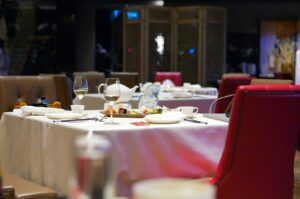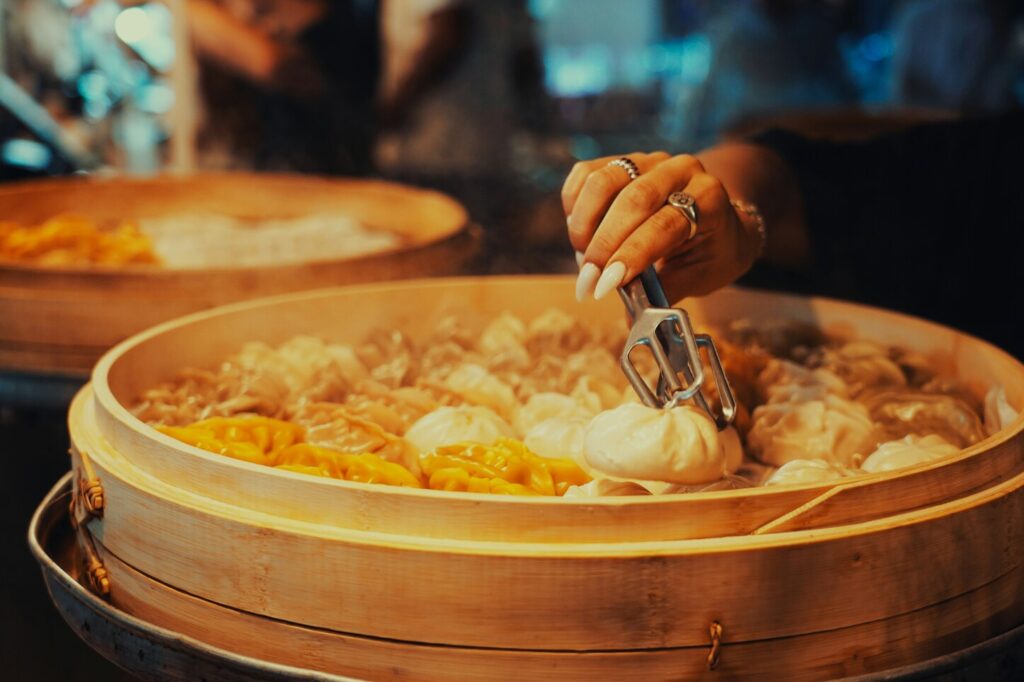
“Author’s Note: Since many have asked where to find the dishes featured here, we’ve updated this list to include places we’ve personally tried, allowing you to visit and enjoy these dishes yourself.”
Singapore’s culinary heritage is a melting pot built over centuries, where sweet and savory flavors mix in harmony. Nowhere is this more evident than at the city’s bustling hawker stalls and acclaimed restaurants. From the intensity of chili sauce to the soothing richness of coconut milk, Singapore’s great dishes are an exploration of heritage, innovation, and bold taste.
Singapore fusion cuisine is more than a catchphrase—it’s a daily reality, reflecting the country’s history, geography, and cultural exchange. Foundational to this fusion are the strong Chinese and Malay influences, which shape the ingredients, flavors, and variations of many iconic dishes.
Eating here is to ignite the senses: the warmth of fragrant rice cooked, the snap of fresh bean sprouts, the comfort of soft boiled eggs, the indulgence of coconut milk, and the unmistakable aroma of roasted chicken or stir fried noodles.
The Hawker Center Experience: Where Cultures and Flavors Meet
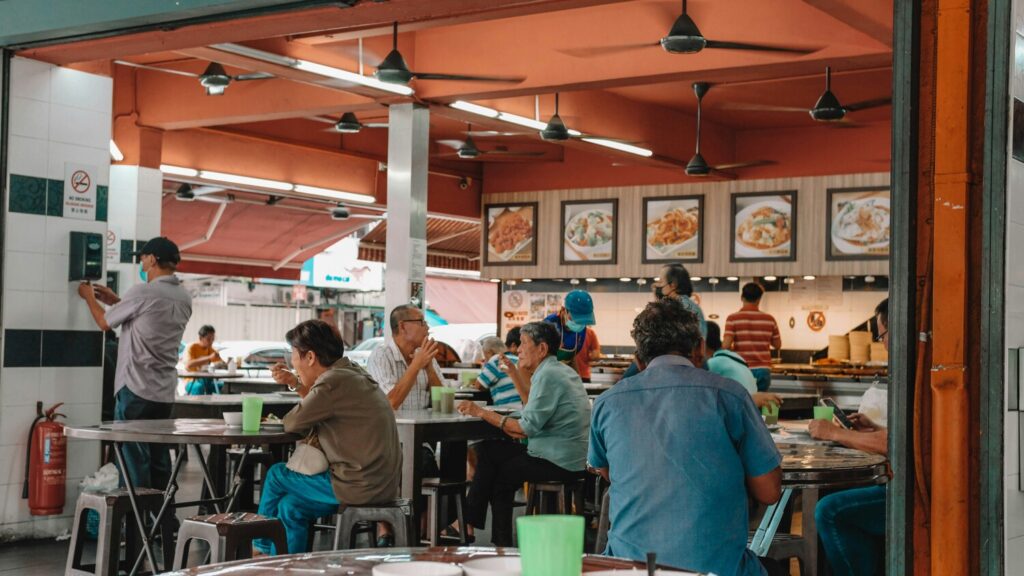
Step into any hawker centre in Singapore and experience a vibrant mix of aromas, sizzling sounds, and colorful sights. These bustling food hubs are the heart of Singapore food culture, where Chinese, Malay, Indian, and Peranakan influences unite under one roof. The air is filled with scents of coconut milk simmering in curries, tangy chili sauce from stir-fried noodles, and the comforting fragrance of rice flour and soy sauce from steaming plates.
Hawker stalls, whether open-air or indoor, showcase culinary heritage. Crave silky poached chicken and fragrant rice cooked in chicken fat of hainanese chicken rice, smoky char kway teow with flat rice noodles and crunchy bean sprouts, or creamy, spicy laksa with thick rice noodles and tofu puffs. The variety is endless—from sweet and savory carrot cake (chai tow kway) to robust pork ribs soup bak kut teh, each dish blends tradition and innovation.
Wander stalls offering spicy chili crab, black pepper crab, fragrant nasi lemak, beef rendang, and chicken curry. Each hawker’s unique blend of fresh herbs, dark soy sauce, and spicy sauce creates unforgettable flavors. Don’t miss minced pork noodles (bak chor mee), fried hokkien mee, or fried kway teow with Chinese sausage and spring onions—a celebration of Singapore’s multicultural palate.
Beyond food, hawker centres preserve Singapore’s culinary heritage. Many family-run stalls pass down recipes and techniques through generations. Dishes like steamed rice cake, oyster omelette, and grilled meat skewers are prepared with passion, reflecting their creators’ ingenuity. Whether enjoying savory bak kut teh, fried chicken, or cooling shaved ice, the hawker centre is a feast for the senses.
1. Laksa
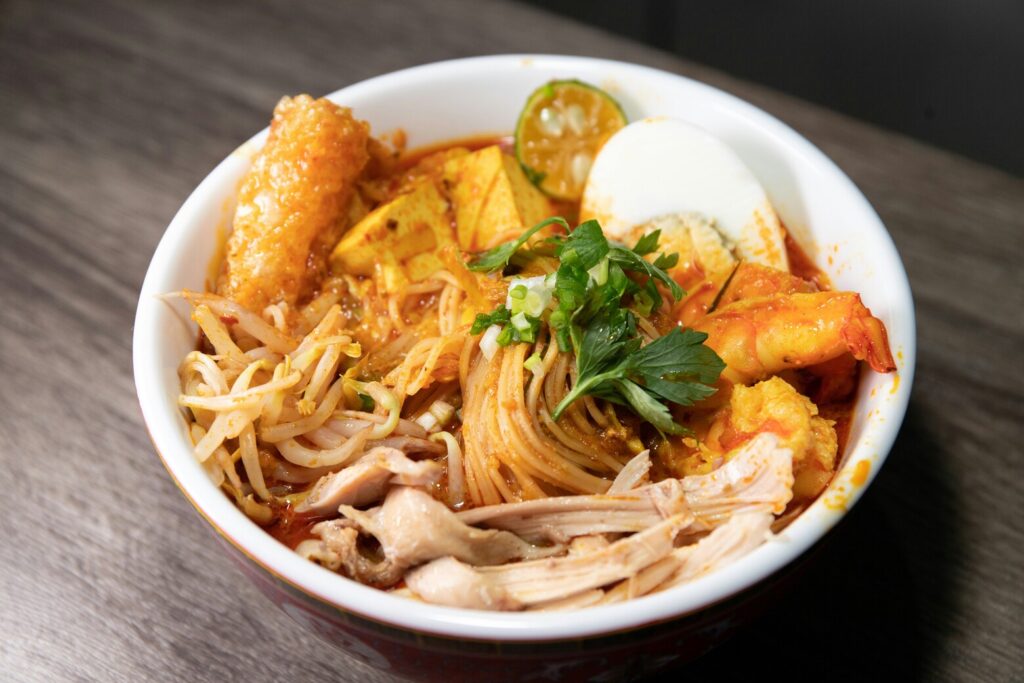
Laksa is a bowlful of contrasts: coconut milk, chili sauce, rice noodles, tofu puffs, seafood, and a dash of spring onions all blend into one deeply comforting, savory dish. The Peranakan roots—born from Chinese and Malay heritage—come alive in every slurp.
Key Features:
Coconut milk is core, lending creaminess and sweetness.
A base of chili sauce, lemongrass, and shrimp paste.
Thick or thin rice noodles and spring onions as a finishing touch.
Bean sprouts, tofu puffs, steamed rice cake, or fish are added for heartiness.
Where to Get the Best Laksa in Singapore
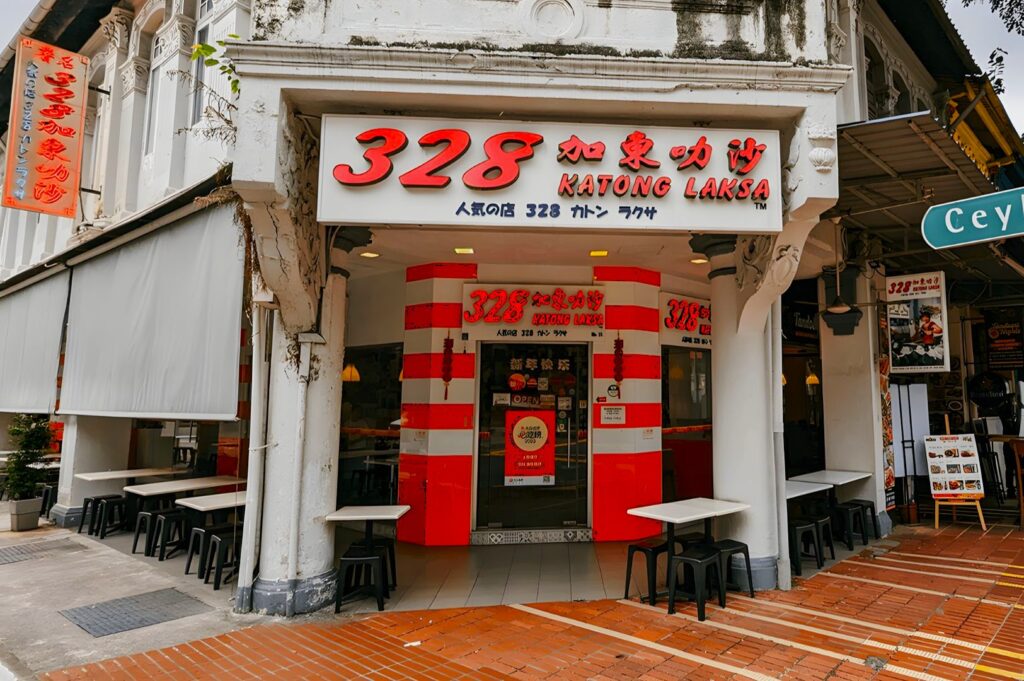
328 Katong Laksa: Famous for creamy coconut milk broth and bite-sized thick rice noodles.
Sungei Road Laksa: Traditional charcoal-cooked curry with smoky depth.
Maxwell Food Centre: Offers vibrant hawker atmosphere with authentic laksa flavors.
Laksa has many faces: modern chefs create fried Laksa, Laksa risotto, or even Laksa-flavored steamed rice cake. Whether at Adam Road Food Centre or a Michelin-starred eatery, it always channels the best of Singapore food.
2. Chili Crab
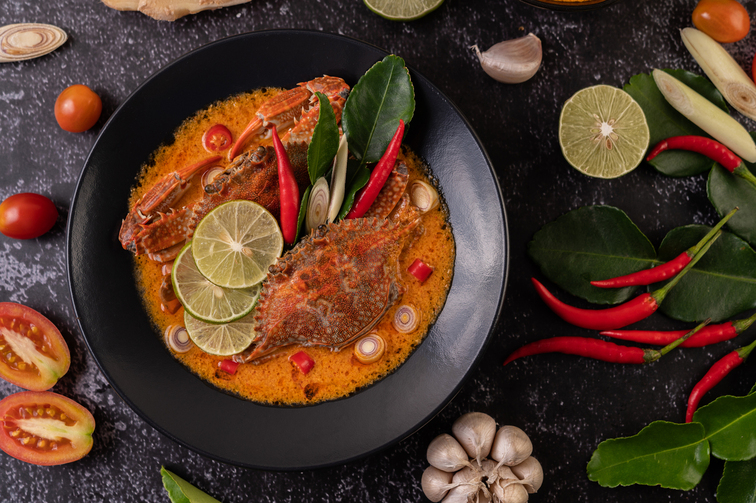
Whether you savor classic singapore chili crab or inventive variations like salted egg yolk crab, there’s a version to suit every craving. Popular at hawker stalls and celebrated restaurants—including favorites at Adam Road Food Centre—chilli crab is best enjoyed with steamed buns or rice cake to soak up the spicy sauce. This festive, hands-on dish unites friends and family in a shared celebration of Singapore food culture.
Key Features:
Poached or roasted chicken, sliced over fragrant rice cooked in chicken fat.
Served with chili sauce, soy sauce, and fresh cucumber.
Soft boiled eggs as a popular upgrade, especially with dark soy sauce.
Where to Get the Best Chili Crab in Singapore
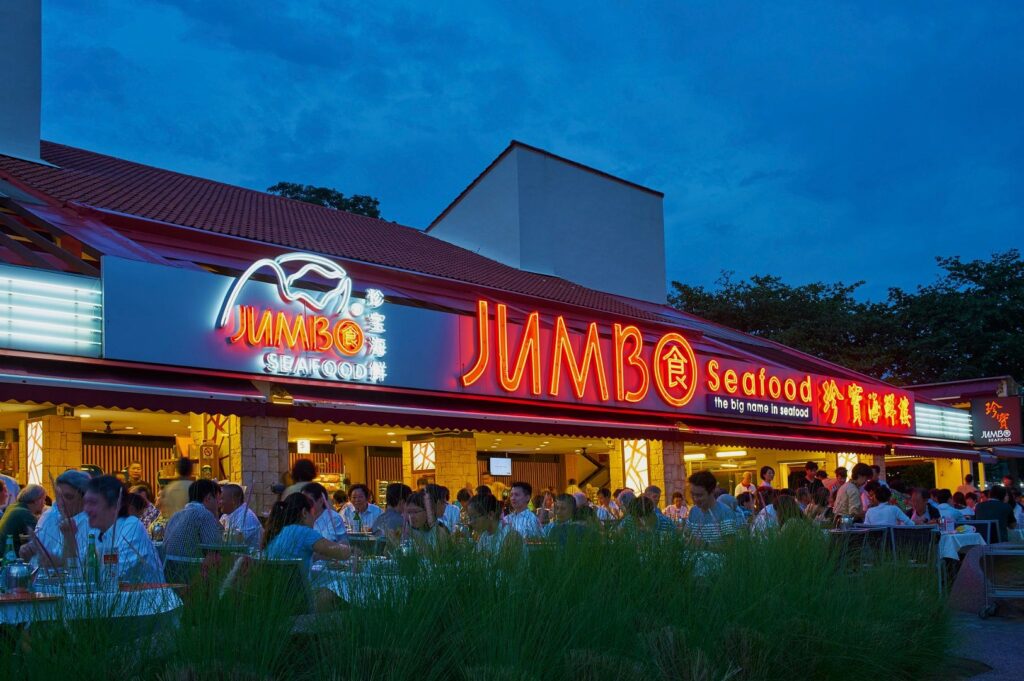
Jumbo Seafood: Renowned for its fresh crabs and flavorful chili sauce, offering a classic chili crab experience in a lively setting.
Long Beach Seafood: Known for its signature black pepper crab and equally delicious chili crab, perfect for seafood lovers.
Chili Crab at East Coast Lagoon Food Village: A casual hawker center option with several stalls serving authentic and affordable chili crab.
3. Char Kway Teow
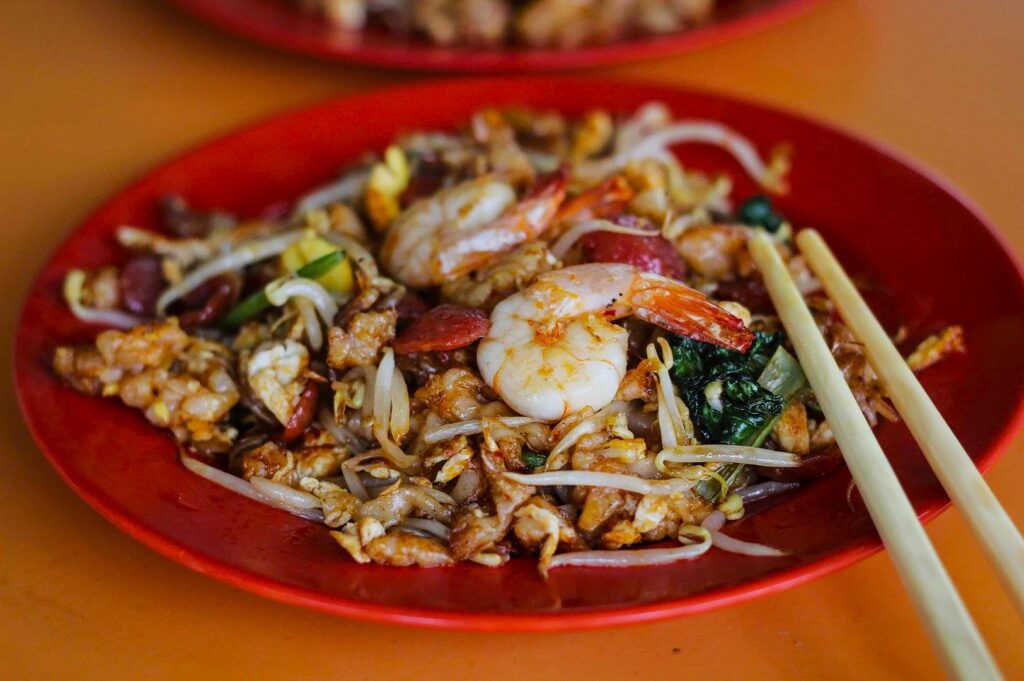
Char kway teow stands as a classic of Singapore food, bringing together flat rice noodles and egg noodles stir fried over intense heat. This hawker food favorite frequently features a hint of peanut sauce or pork ribs, drawing crowds at Adam Road Food Centre and hawker stalls citywide.
Key Features:
- Flat rice noodles intertwined with egg noodles, all stir fried to achieve deep “wok hei.” Some versions use white rice noodles for a unique texture.
- Generous use of chili sauce and dark soy sauce provides color, spice, and a signature aroma.
- Bean sprouts, minced pork, roasted chicken, spring onions, and occasional seafood or Chinese sausage.
- Enriched with coconut milk for extra depth and creaminess.
Where to Try the Best Char Kway Teow in Singapore
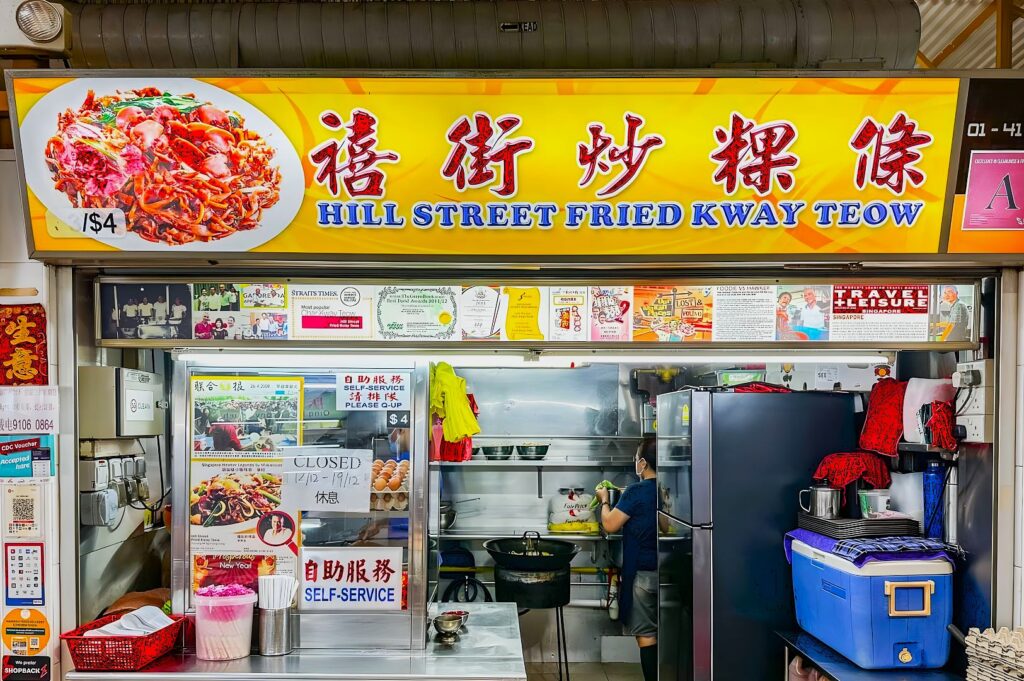
Hill Street Char Kway Teow: Renowned for its smoky wok hei flavor, this stall serves a perfect balance of flat rice noodles, egg, Chinese sausage, and crunchy bean sprouts, making it a must-visit for char kway teow enthusiasts.
Be it shared among friends at a busy hawker center or enjoyed at Indian restaurants offering their own peanut sauce twist, char kway teow delivers a savory dish with every bite—a true representation of the vibrancy of Singapore fusion cuisine.
4. Nasi Lemak
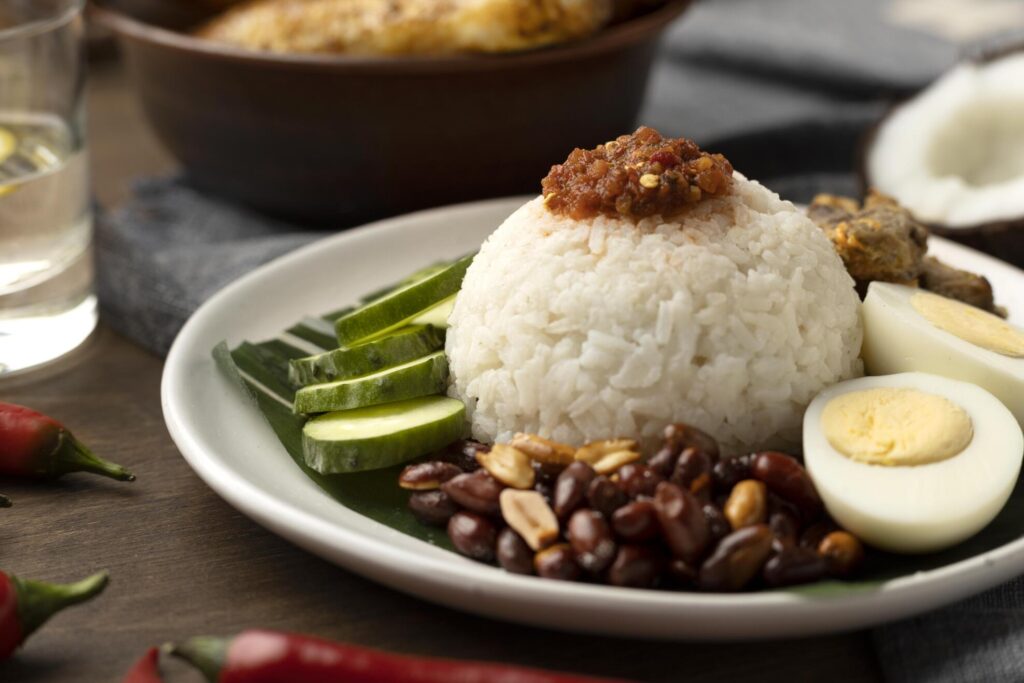
Nasi lemak—coconut milk-infused fragrant rice cooked until tender, surrounded by fried chicken, roasted peanuts, crispy anchovies, bean sprouts, and boiled egg—is the quintessential Malay contribution to Singapore food. Peanut sauce, sambal, and chili sauce bring heat and tang, while modern versions may include chicken curry or roasted chicken. Fried tofu is sometimes served as a side, adding protein and texture, and sweet sauce is a popular condiment for some accompaniments.
Key Features:
- Fragrant rice cooked with coconut milk, pandan, and ginger.
- Chili sauce and spicy sauce for the signature kick.
- Bean sprouts, peanuts, egg, fried fish, or roasted chicken. Fried tofu and sweet sauce are also common accompaniments.
Where to Try the Best Nasi Lemak in Singapore
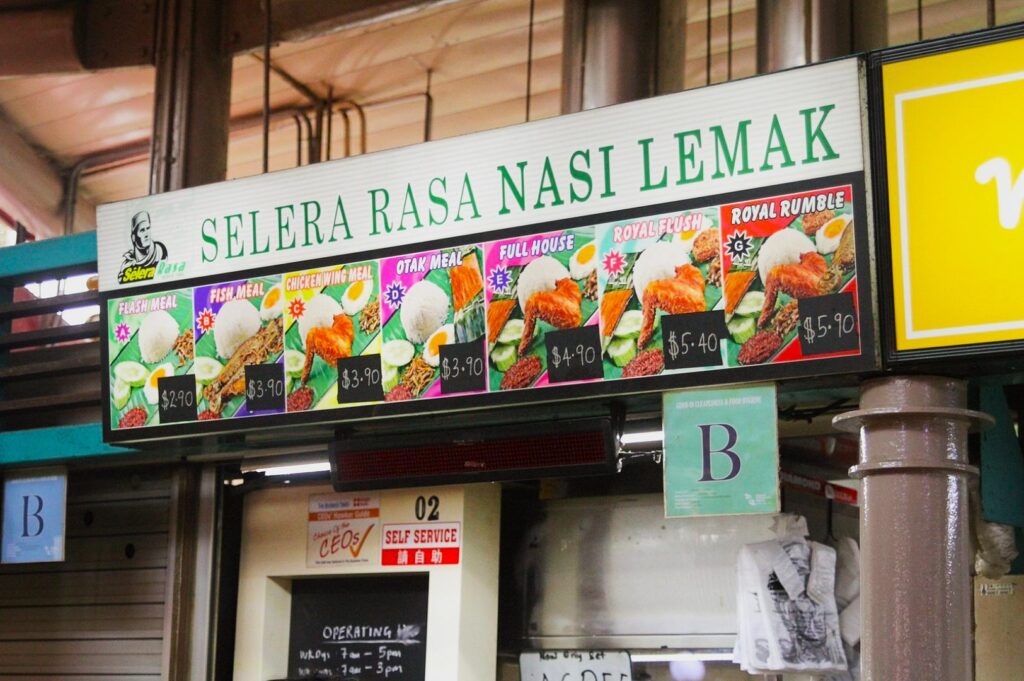
Selera Rasa Nasi Lemak (Adam Road Food Centre): Famous for its fragrant coconut milk rice and flavorful sambal, this stall consistently draws long queues from locals and tourists alike.
The Coconut Club: Known for its premium take on nasi lemak, featuring rich coconut rice paired with crispy fried chicken and tasty sides in a modern setting.
Zam Zam Restaurant: A popular spot near the Sultan Mosque, offering generous portions of nasi lemak with authentic Malay flavors and a variety of curry accompaniments.
In hawker stalls or Indian restaurants, nasi lemak’s creamy richness and balance between savory, spicy, and sweet flavors prove why Singapore food culture celebrates this dish for all meals.
5. Bak Kut Teh
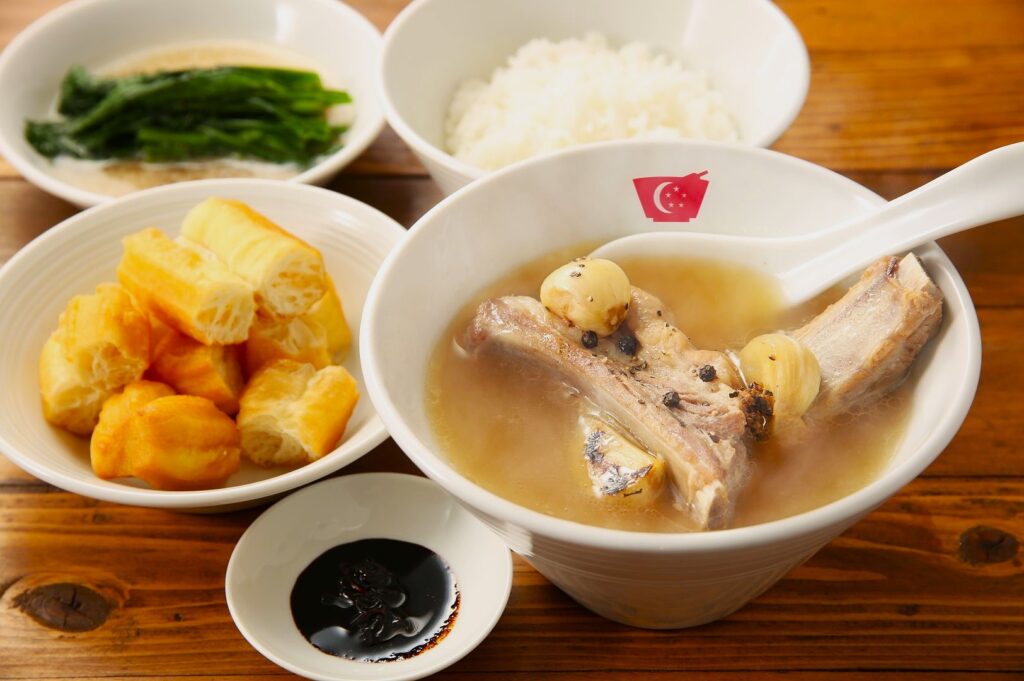
Bak kut teh is the ultimate savory dish for comfort in Singapore food culture. This traditional pork soup is simmered with pork ribs, garlic, white pepper, soy sauce, herbs, and sometimes a hint of coconut milk for extra richness. Served at hawker stalls and food courts alike, bak kut teh is a beloved staple year-round, especially when enjoyed with soft boiled eggs or steamed rice cake.
Key Features:
- Tender pork ribs and minced pork in a fragrant, peppery broth enhanced with dark soy sauce.
- A side of bean sprouts, spring onions, and more soy sauce or dark soy sauce for flavor depth.
- Choice of soft boiled eggs or steamed rice cake as hearty accompaniments.
Where to Get the Best Bak Kut Teh in Singapore
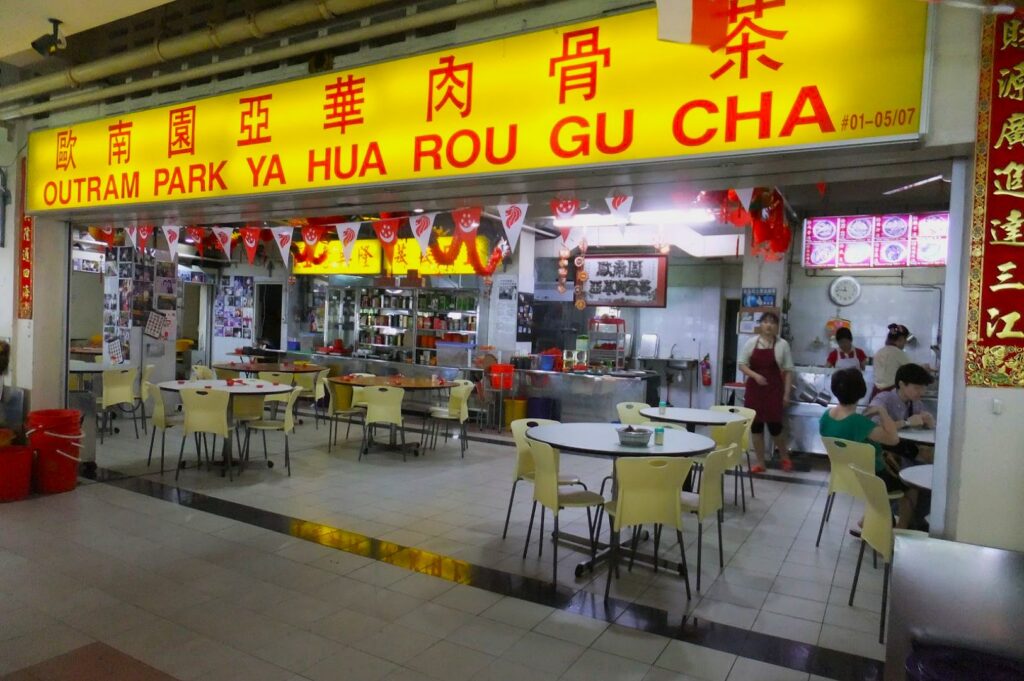
Outram Park Ya Hua Rou Gu Cha: Known for its rich, peppery broth and tender pork ribs, this stall is a favorite among locals and visitors alike. Located in a spacious open-air setting, it offers a comforting and authentic bak kut teh experience.
Song Fa Bak Kut Teh: A well-established name with multiple outlets, Song Fa serves a flavorful and aromatic pork ribs soup with traditional herbs and spices. Their tender meat and balanced broth make it a must-try.
Founder Bak Kut Teh: Famous for its herbal bak kut teh, this stall offers a lighter yet deeply flavorful broth, perfect for those who enjoy a less peppery, more herbal taste. It’s a popular choice in the hawker center scene.
Whether you tuck into a warming bowl after a day spent discovering Singapore food, or seek it out at hawker stalls for its signature aroma and taste, bak kut teh brings comfort, tradition, and that unmistakable savory satisfaction with every spoonful.
Popular Noodle Dishes in Singapore
Singapore’s vibrant food scene is renowned for its variety of popular noodle dishes, each showcasing unique flavors and textures. One standout is bak chor mee, or minced pork noodles, a dish featuring springy egg noodles tossed with minced pork, sliced pork, pork fat, and a tangy chili sauce. Another favorite is fish ball noodles, where chewy fish balls and fish cake accompany springy egg noodles in a light, savory broth often enriched with chicken broth or fish soup. Char kway teow, made with flat rice noodles stir fried in pork lard with dark soy sauce and chili sauce, delivers rich flavors and smoky wok hei. These noodle dishes, found in hawker stalls and food courts across Singapore, perfectly embody the city’s culinary fusion and are a must-try for any visitor.
Signature Fusion Dishes That Define Singapore’s Culinary Identity
Singapore fusion cuisine is a vibrant celebration of diverse cultures blending into unique and flavorful dishes. Beyond the well-known classics, innovative creations like fried rice noodles infused with local spices, or rice noodle rolls served with a twist of spicy sauce, showcase this culinary harmony. Traditional Singaporean breakfast staples such as kaya toast paired with sweet milk tea from a local coffee shop reflect the seamless melding of East and West. The iconic Singapore Sling cocktail, with its tropical flavors and colonial heritage, complements these dishes perfectly. Each bite and sip is a journey for the taste buds, capturing Singapore’s rich history and evolving food culture in every serving.
Eat in Singapore: The Everyday Food Adventure
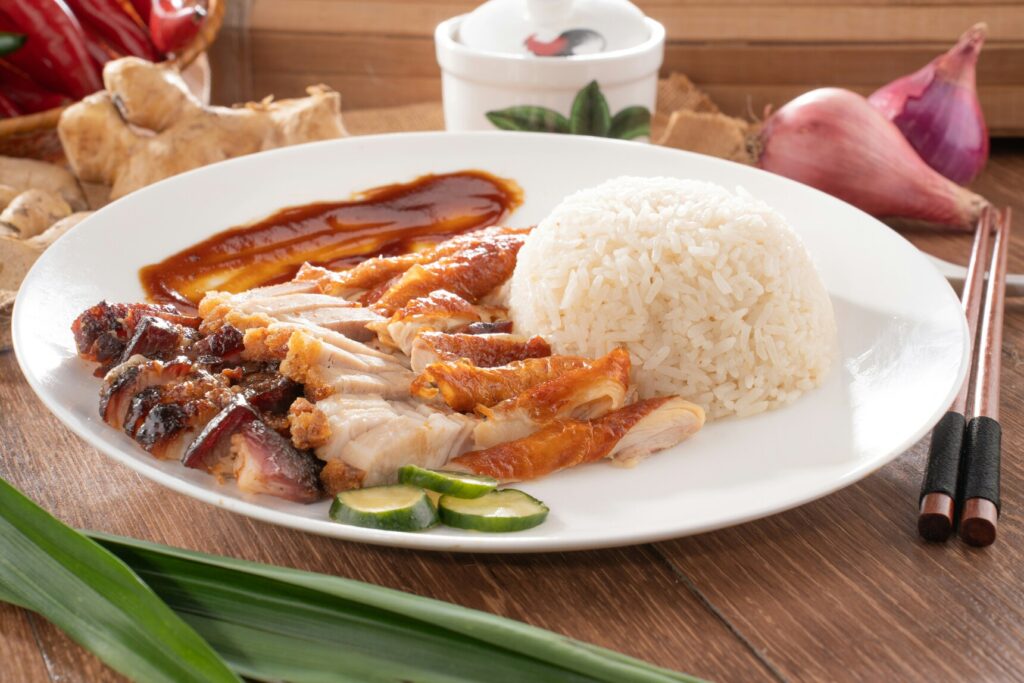
In Singapore, breakfast might be kaya toast and soft boiled eggs with coffee, lunch a heaping portion of hainanese chicken rice, and dinner a shared spread of chili crab, char kway teow, nasi lemak, and bak kut teh. Snacks like steamed rice cake, savory carrot cake, or peanut sauce-drizzled skewers fill the gaps. From hawker food stalls to the finest Indian restaurants, every dish tells a part of the Singapore food story.
Experience Singapore Food Culture Firsthand
The evolution of Singapore food is ongoing. With every plate of hainanese chicken rice, every saucy chili crab, every mouthful of char kway teow, nasi lemak, carrot cake, bak kut teh, or kaya toast, you taste Singapore’s innovative and inclusive spirit. Hawker stalls, food courts, and Indian restaurants—each offers a different slice of a shared culture built on diversity, creativity, and a deep love for food.
Ready to embark on your own journey through Singapore fusion cuisine? Head to Adam Road Food Centre, try hawker stalls and Indian restaurants, savor each iconic dish, and let every bowl, plate, and spoonful awaken your senses to the heart of this extraordinary city.

